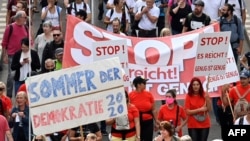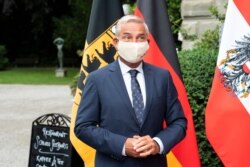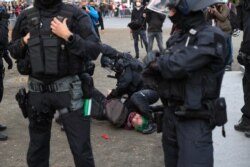Violent far-right groups are using rising frustration with pandemic lockdowns in their recruitment efforts, German officials fear.
Germany's domestic intelligence agency is closely monitoring protesters of coronavirus restrictions, worried that the influence of militants, including Nazi admirers, ultranationalists and Holocaust deniers, is growing.
While Germany's far-right Alternative for Germany (AfD) has seen a precipitous slump in its poll ratings since the pandemic struck — the party was polling at just 9% of support last month — officials say violent right-wing extremists, united in their opposition to what they say are illegitimate curbs on freedom, are gaining a boost from the coronavirus and strengthening their mobilization around anti-government conspiratorial narratives.
"Actors within this movement largely see the COVID-19 pandemic as a chance to spread their ideology more widely and to reach a broader recruitment base," warned the Counter Extremism Project (CEP), a nonprofit nongovernmental organization headquartered in New York, in a lengthy report assessing threats posed by transnational violent right-wing extremism in Europe and the United States.
Previously, Germany's violent far-right agitators advanced themselves based largely on hostility to immigrants and Islam. Now, they are more focused on pandemic restrictions and coronavirus vaccines, warn analyst and officials.
In an increasingly networked, transnational violent far-right scene, German militants have been buoyed by this month's assault on the U.S. Congress.
"We are doubling down on our scrutinizing of groups and individuals on watch lists and adding to the lists — especially in the wake of the storming of the U.S. Congress," a German intelligence official told VOA in reference to the January 6 ransacking of the U.S. Capitol.
According to researchers, Germany accounts for a large proportion of European adherents of the QAnon conspiracy movement, which believes U.S. President Donald Trump has been waging a secret war against elite Satanists and pedophiles in government, business and the media. Q flags, which were on display January 6 in Washington, have also been spotted being unfurled at anti-lockdown protests in Germany.
Germany's Bundestag was targeted in August when several hundred protesters clambered over fencing ringing the Reichstag, the seat of Germany's national parliament, and ran toward the entrance, some waving the "Reichsflagge" — the black, white and red flag of the German Empire, colors later adopted by the Nazis. Police pushed the mob back.
Last month, officials in the southwestern Baden-Wuerttemberg region added the "Querdenken 711" group to a watch list, the state's Interior Ministry said.
"Legitimate protest against coronavirus restrictions is increasingly making way for a general hate against state and politics," Interior Minister Thomas Strobl told Reuters.
Strobl said violent right-wing actors are spreading false claims to incite hate against the state, making "absurd comparisons" with the Nazis, and minimizing the Holocaust.
Querdenken, which means lateral thinking, first emerged in Stuttgart and was started by IT entrepreneur Michael Ballweg. At first, it attracted an amorphous assortment of anti-establishment supporters. But violent far-right elements appear to have become more pronounced in the group, which has increasingly embraced the idea that the modern German state is illegitimate.
Last November, far-right influenced football hooligans latched on to a Querdenken rally in Leipzig, turning it violent. A planned Dresden anti-lockdown rally last month was advertised on extreme-right social media channels and called on "Hooligans, Nationalists and Ultras" to gather in Saxony state's capital for the demonstration.
"In Germany, violent XRW actors have joined demonstrations in large numbers organized by various groups protesting COVID-19-related restrictions and regulations," according to the CEP.
Critics of the AfD accuse the party of providing some political cover for coronavirus protesters, pointing to comments by their lawmakers in the Bundestag. Detlev Spangenberg, an AfD lawmaker from Saxony, noted this month, "We've had a lockdown since November, and the numbers are not going down." He added, "We are just saying that the collateral damage of lockdowns outweighs the benefits."
Last year, the German government banned four violent far-right groups, including the Wolfsbrigade 44, which wants to reestablish a Nazi government.
German authorities have been accused of being too slow, though, in cracking down on violent groups and not taking the threat they pose seriously enough. Political pressure mounted for action following a string of incidents in 2019, including the assassination of a local politician in Hesse and a synagogue attack in Halle.








